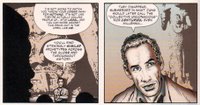Testament #1
 In the rush of prose and television writers storming the gates of sequential art, along comes someone truly different: Douglas Rushkoff. He doesn't have a hit TV series, he doesn't write thrillers which tickle the bottom of the bestseller lists, and he's not Stephen King. He's an award-winning thinker, a leading light in the new philosophies of media ecology and cyberpunk and disinformation. I've read a lot of his non-fiction writing and always found it well-argued and engaging, even when I didn't agree.
In the rush of prose and television writers storming the gates of sequential art, along comes someone truly different: Douglas Rushkoff. He doesn't have a hit TV series, he doesn't write thrillers which tickle the bottom of the bestseller lists, and he's not Stephen King. He's an award-winning thinker, a leading light in the new philosophies of media ecology and cyberpunk and disinformation. I've read a lot of his non-fiction writing and always found it well-argued and engaging, even when I didn't agree.
Make no mistake about Rushkoff's new Vertigo series, Testament: it's about ideas, and big ones at that. Featuring Open Source Religion at it's core, Testament features stories from the Pentateuch recast in a dystopian near-future of implanted RFID tags and a government that has outlawed privacy. Rushkoff's theory that these archetypes reenact themselves throughout history is made abundantly clear: in case there's any doubt, he appears as a lecturer and explains the whole thing in a two-page infodump. It's an interesting idea, and the cause of reclaiming the Bible from the Religious Right appeals to me.
It doesn't make for good comic bookery, however. The high concept pitch here is simple: The Ten Commandments meets The Invisibles. The problem is that Testament has neither Yul Brynner nor King Mob. A great test for infodump: can you replace it all with Star Trek technobabble, and still get a compelling story? You don't need to pay attention to "the inversion of the flux capacitors" to follow your average Star Trek, and don't need to follow every detail of memes and fictional reality and magik to enjoy The Invisibles. It's there if you want it, but the story is driven by plot and characterization. King Mob and Ragged Robin and Fanny and the rest of the cast of Grant Morrison's classic Vertigo series were sexy and dynamic and charismatic. No matter how far afield the concepts flew, or how deep the infodump went ... the characters pulled the reader through to the next issue. There was wit and humor and things that exploded. In this bald attempt to re-bottle that lightning (including a pull-quote blessing from Morrison himself), all that is missing. All that's left is the trappings of hip cyber-revolutionaries who are little but ventriloquist dummies for Rushkoff's ideas. If you use your best Charlie Brown Teacher Voice to run through the infodumps in Testament, you aren't left with much: wooden dialogue, stereotypical characters, and a paint-by-numbers plot.
If Testament dropped the thin fiction suit and simply became the essay it is at heart, I'd buy it in a minute. I don't know a non-fiction comic can sustain itself in this market, but I'm quite sure that a bad story wrapped around a non-fiction comic won't sustain itself either. If this series fails, it won't be because the market's not receptive to revolutionary ideas ... it will be because the market wants good storytelling first and foremost, and Rushkoff doesn't deliver.

2 comments:
Haven't read any of his serious work, but
- it struck me that a tale about the future is not a good place to demonstrate the story continues to happen. Especially when you then alter the biblical story. At this point anything can directly speak to anything else, be a continuation or whatever, because the writer tweaks both ends of the comparison.
- In combination with the infodump you mention, the biblical scenes are just overkill. Open Source Religion is an interesting and new concept, but not a difficult one. I'm sure there's plenty of tricky details, but the overall concept is very simple.
Also, thanks for preempting the usual cry from fans along the lines of "afraid of change".
I think you hit exactly why I wasn't bowled over by this book, even though I did like the idea being put forth. For me, character is king. Hell, great characterization is an excellent way to explore sub-texts and big ideas (The Invisibles is a great example).
Post a Comment